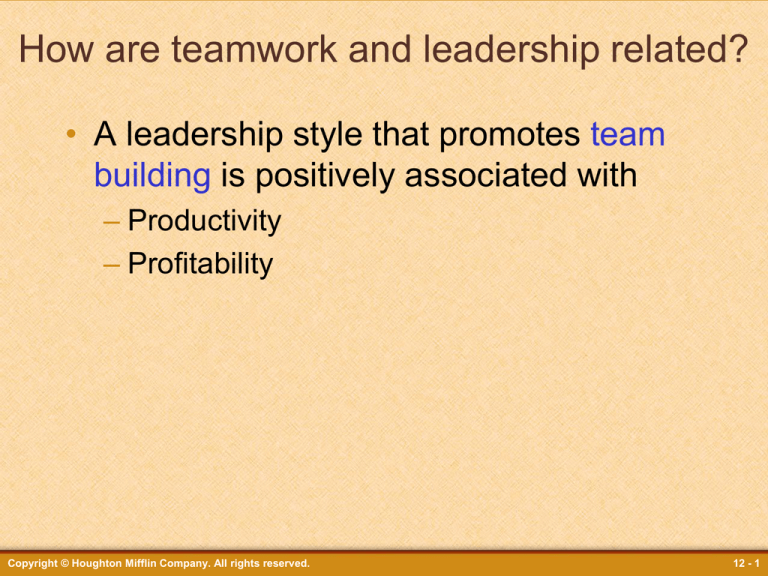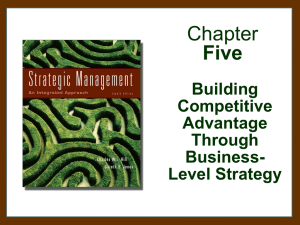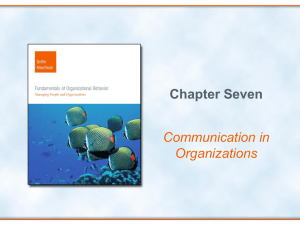
How are teamwork and leadership related?
• A leadership style that promotes team
building is positively associated with
– Productivity
– Profitability
Copyright © Houghton Mifflin Company. All rights reserved.
12 - 1
Team Building:
• Teamwork is often associated with
– Reduced turnover
– Cost reduction
– Large production increases
– Gains in quality
– Improved customer service
Copyright © Houghton Mifflin Company. All rights reserved.
12 - 2
Team Building:
• Teamwork
– Job gets done efficiently and harmoniously
– Fewer interpersonal relations problems
– Positive effect on the physical and
psychological well-being of employees
– Higher levels of job satisfaction and less
stress
Copyright © Houghton Mifflin Company. All rights reserved.
12 - 3
Team Building:
• Synergy is another positive outcome of
teamwork
– The interaction of two or more parts to
produce greater results than the sum of the
parts taken individually
• Especially important when organizations
value creativity
Copyright © Houghton Mifflin Company. All rights reserved.
12 - 4
Teamwork Doesn’t
Come Naturally
• The concept of teamwork has been
around a long time
• Many organizations work hard to get all
employees to pull together as a team
• Most jobs today require ongoing
interaction between coworkers and
managers
Copyright © Houghton Mifflin Company. All rights reserved.
12 - 5
Teamwork Doesn’t
Come Naturally
• Requires commitment and cooperation
of every employee
• Requires meaningful employee
participation in planning, solving
problems, and developing ways to
improve
Copyright © Houghton Mifflin Company. All rights reserved.
12 - 6
Teamwork Doesn’t
Come Naturally
• Barriers
– Some value individualism over teamwork
– Conflict can cause a breakdown in
relationships
– Heavy workloads and long hours lead to
weary employees
• Teamwork flourishes under strong
leadership
Copyright © Houghton Mifflin Company. All rights reserved.
12 - 7
The Transition to
Team-Based Structures
• Teams have become popular because
they encourage participative
management
– Process of empowering employees to
assume greater control of the workplace
• There are two common types of teams
– Self-managed
– Cross-functional
Copyright © Houghton Mifflin Company. All rights reserved.
12 - 8
Self-Managed Teams
• Assume responsibility for traditional
management tasks as part of regular
work routine
Copyright © Houghton Mifflin Company. All rights reserved.
12 - 9
Self-Managed Teams
• Typically
– 5 to15 members
– cross train and rotate jobs within group
• Increases accountability
• Reduces time on dull and repetitive
tasks
• Taps employees full potential
Copyright © Houghton Mifflin Company. All rights reserved.
12 - 10
Cross-Functional Teams
• Task groups staffed with a mix of
specialists focused on a common
objective
Copyright © Houghton Mifflin Company. All rights reserved.
12 - 11
Cross-Functional Teams
• Typically
– Temporary units
– Members from different departments
• Involve developing new work
procedures or products, devising work
reforms, or introducing new technology
• Often make decisions that directly
influence improvements
Copyright © Houghton Mifflin Company. All rights reserved.
12 - 12
Real Teams Are Rare
• Greater use of teams in organizations
• Most "teams" are really single-leader
work groups that rely on their leaders
for
– Purpose
– Goals
– Motivation
– Assignments
Copyright © Houghton Mifflin Company. All rights reserved.
12 - 13
Real Teams Are Rare
• Using teams is not a quick fix
– Can take one or two years for members to
learn all the tasks they will perform as they
rotate from job to job
– Time for team to be comfortable
• Making decisions, scheduling work, hiring,
training, and problem solving
Copyright © Houghton Mifflin Company. All rights reserved.
12 - 14
Real Teams Are Rare
• A real team
– Draws its motivation more from its mission
and goals than from its leader
– Each member is accountable for the
group's performance and results
Copyright © Houghton Mifflin Company. All rights reserved.
12 - 15
Team-Building
Skills for Leaders
• In today’s environment, there is a high
demand for individuals with strong
leadership skills
Copyright © Houghton Mifflin Company. All rights reserved.
12 - 16
Team-Building
Skills for Leaders
• Successful leaders share some
behavioral characteristics
• Two of the most important are
– Consideration
– Structure
• These dimensions are separate and
independent of each other
Copyright © Houghton Mifflin Company. All rights reserved.
12 - 17
Consideration
• Extent to which a manager’s
relationships with workers are
characterized by
– Mutual trust
– Respect for employees
– Consideration of feelings
– Warmth in interpersonal relationships
– Good rapport
– Two-way communication
Copyright © Houghton Mifflin Company. All rights reserved.
12 - 18
Structure
• Extent to which a supervisor is likely to
direct workers toward goal attainment
• Managers actively direct group activities
by
– Scheduling
– Planning
– setting goals
– Communicating information
– Evaluating performance
Copyright © Houghton Mifflin Company. All rights reserved.
12 - 19
Improving Consideration Skills
• The effective use of consideration skills
creates a positive work environment
• Leaders with consideration skills follow:
– Law of empathy – sensitivity and
awareness of the needs, feelings, and
motivations of those they lead
Copyright © Houghton Mifflin Company. All rights reserved.
12 - 20
Improving Consideration Skills
• Practices that can improve
consideration
– Recognize accomplishments
– Provide for early and frequent success
– Take a personal interest in each employee
– Establish a climate of open communication
– Discover individual employee values
Copyright © Houghton Mifflin Company. All rights reserved.
12 - 21
Improving Structure Skills
• The supervisor who incorporates
structure into his or her leadership style
plays an active role in directing group
activities.
• The team builder gives the group
– Direction and standards
– Maintains accountability
Copyright © Houghton Mifflin Company. All rights reserved.
12 - 22
Improving Structure Skills
• Practices that develop structure skills
– Communicate your expectations
– Encourage individual and team goal setting
– Provide specific feedback often
– Deal with poor performance immediately
Copyright © Houghton Mifflin Company. All rights reserved.
12 - 23
Additional Leadership Qualities
• Character
• Emotional intelligence
– Both can be developed
– Key to growth is self-awareness
Copyright © Houghton Mifflin Company. All rights reserved.
12 - 24
Character
• Personal standards of behavior
– Honesty
– Integrity
– Moral strength
• Impossible to build trusting relationships
without character
Copyright © Houghton Mifflin Company. All rights reserved.
12 - 25
Character
• Effective leadership characterized by
– Honesty
– Truthfulness
– Straight dealing
Copyright © Houghton Mifflin Company. All rights reserved.
12 - 26
Emotional Intelligence
• Ability to monitor your own and others’
emotions and deal with them effectively
• Leaders with emotional intelligence are
– More likely to detect friction and eliminate
conflict
– More flexible
– Better situational leaders
Copyright © Houghton Mifflin Company. All rights reserved.
12 - 27
Teamwork:
The Employee’s Role
• Most valued employees are willing to
assume leadership roles and
responsibilities
• Each team member should
– assume an active part in helping the work
unit achieve its mission
– be a team builder
Copyright © Houghton Mifflin Company. All rights reserved.
12 - 28
Employees as Leaders
• Effective leaders are helping work team
members develop leadership skills
• The team’s success does not always
ride on one person
• Merit in establishing diversity of
leadership within work group
Copyright © Houghton Mifflin Company. All rights reserved.
12 - 29
Valued Team Members
• Every employee has potential to be a
leader
• Success often depends on your ability
to be an effective team member
Copyright © Houghton Mifflin Company. All rights reserved.
12 - 30
Becoming a
Valued Team Member
• Avoid becoming part of a clique or
subgroup within the team
• Avoid any action that might sabotage
the team
• Keep in mind that effective team
membership depends on honest, open
communication
• Do not feel the need to submerge your
own strong believes, creative solutions,
and ideas
Copyright © Houghton Mifflin Company. All rights reserved.
12 - 31
Total Person Insight
Great challenges require great teamwork,
and the quality most needed among
teammates amid the pressure of a difficult
challenge is collaboration….Each person
brings something to the table that adds
value to the relationship and synergy to
the team.
John C. Maxwell
Author, The 17 Essential Qualities of a Team Player
Copyright © Houghton Mifflin Company. All rights reserved.
12 - 32
Summary
• Teamwork ensures that a job gets done
and that it gets done efficiently
• Teamwork can mean the difference
between a profitable and unprofitable
organization
• Team-building leadership style is suited
to today’s employees
Copyright © Houghton Mifflin Company. All rights reserved.
12 - 33
Summary
• Effective teamwork is informal and
relaxed
• People are
– Involved
– Interested
– Eager to participate in work-related
problems
• Goals and objectives are clearly
understood
Copyright © Houghton Mifflin Company. All rights reserved.
12 - 34
Summary
• Two dimensions of supervisory
leadership
– Consideration
– Structure
• Additional qualities of effective
managers
– Character
– Emotional intelligence
Copyright © Houghton Mifflin Company. All rights reserved.
12 - 35
Summary
• Effective work group members should
assume leadership roles
• Each helps the group achieve its
mission
Copyright © Houghton Mifflin Company. All rights reserved.
12 - 36
Summary
• Learn to understand your boss
• Assess your strengths
• Identify personal characteristics that
might impede or facilitate a working
relationship
Copyright © Houghton Mifflin Company. All rights reserved.
12 - 37


















